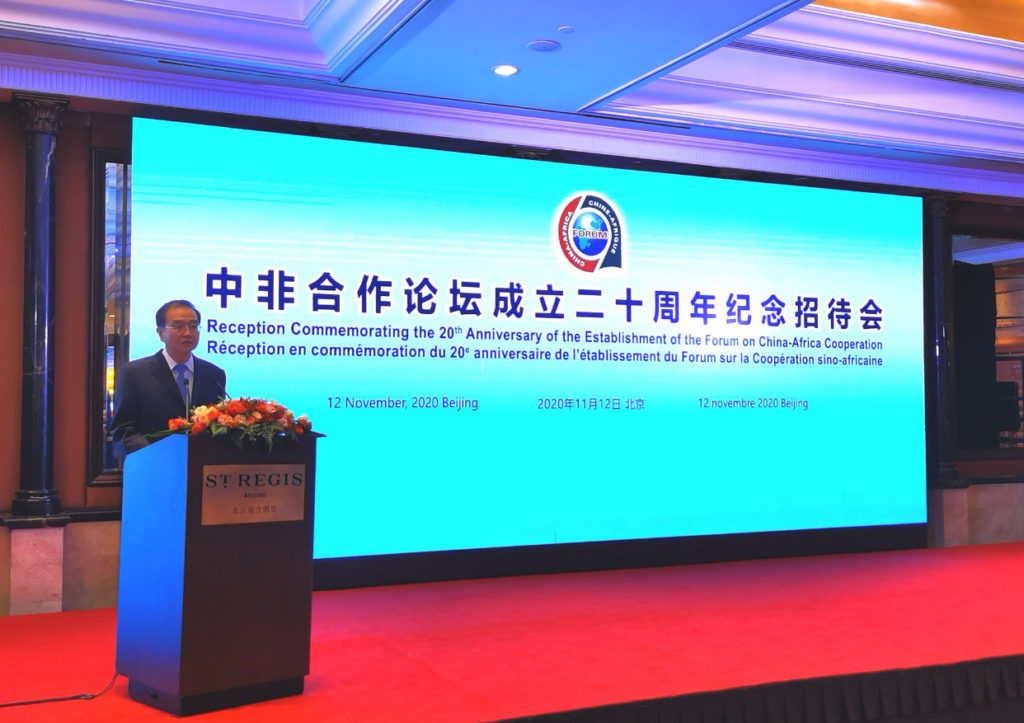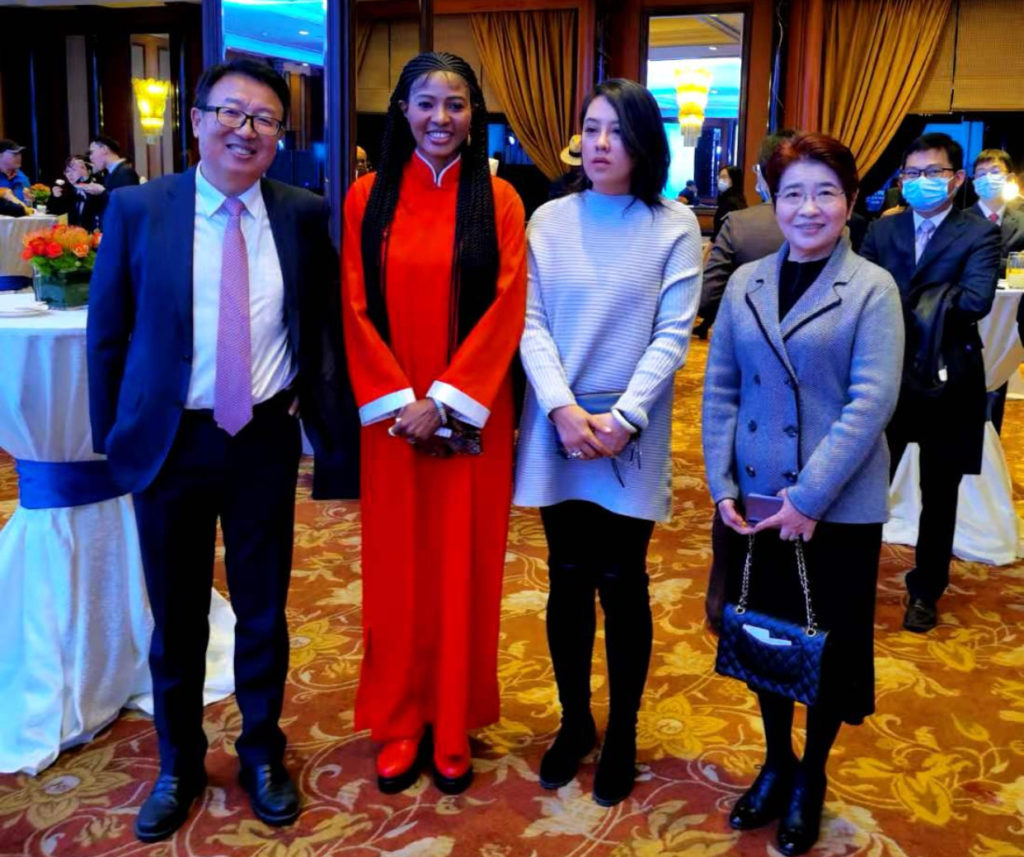NAIROBI, Kenya Nov 14 – The 20th anniversary of the Forum on China-Africa Cooperation (FOCAC) was marked this week, with focus on the tremendous strides made in development.
Chinese State Councilor and Foreign Minister Wang Yi, who led the celebrations in Beijing, said FOCAC heralded a new era of relations between the two sides, especially through strengthened solidarity and friendship.
Outlining some of the infrastructural development, Wang Yi said China has built for Africa over 6,000 kilometers of railways and the same mileage of roads.
China has also built nearly 20 ports and over 80 large-scale power plants, and more than 130 medical facilities, 45 stadiums and over 170 schools powering Africa’s economic and social development.
Wang Yi disclosed that, to date, China has provided some 120,000 government scholarships, and opened 61 Confucius Institutes and 44 Confucius Classrooms in 46 African countries besides sending in more than 21,000 Chinese medical personnel.

FOCAC was inaugurated by Chinese and African leaders in Beijing 20 years ago shortly after the adoption of the United Nations Millennium Declaration.
“A new era was thus opened for China-Africa relations,” Wang Yi said during celebrations in Beijing on Thursday.
Over the two decades, he said, by acting along the prevailing trend of peace, development and cooperation, FOCAC has established itself as a pacesetter for cooperation with Africa, a champion of multilateralism, and a fine example of mutually beneficial cooperation.
How FOCAC has strengthened China-Africa solidarity and friendship. It has grown into a big family where all are equal members bound by brotherly ties and treat each other with respect, regardless of size or strength. We have carried forward the profound friendship forged in our struggles for national liberation. We have firmly supported each other on issues concerning core interests and major concerns. We have stood together in upholding the banner of multilateralism, fairness and justice. Together, we have elevated the international standing and influence of developing countries and safeguarded the overall interests of the developing world.
Over the past 20 years, FOCAC has come a long way in boosting common development of China and Africa. In 2019, trade between China and Africa hit US$208.7 billion, and total Chinese FDI in Africa reached US$49.1 billion, grown by 20-fold and 100-fold respectively compared with 20 years ago. We have jointly formulated and implemented the ten cooperation plans (adopted at the Johannesburg Summit) and the eight major initiatives (adopted at the Beijing Summit). Dozens of economic and trade cooperation zones and industrial parks are up and running across Africa. China has built for Africa over 6,000 kilometers of railways and the same mileage of roads, nearly 20 ports and over 80 large-scale power plants, and more than 130 medical facilities, 45 stadiums and 170 or so schools. These infrastructures have made a big difference in Africa’s economic and social development. The African Union (AU) Conference Center, the Mombasa-Nairobi railway, and the Maputo-Katembe Bridge, key projects in Africa’s drive to achieve the “Century Dream”, have been dedicated one after another, and stand as monumental symbols of the shared development of China and Africa.

Over the past 20 years, FOCAC has come a long way in enhancing the friendship between the Chinese and African peoples. Mechanisms, such as the Think Tank Forum, the People’s Forum, the Press Center and the Youth Festival, are playing a greater role as bridges of friendship. To date, China has provided some 120,000 government scholarships, and opened 61 Confucius Institutes and 44 Confucius Classrooms in 46 African countries. As many as 21,000 Chinese medical personnel have worked, or are working, in 48 African countries, providing treatment to around 220 million African people. When West Africa was raged by Ebola in 2014, over 1,000 Chinese health professionals defied the dangers and rushed to their help. Today, facing COVID-19, China and Africa have again come together in a joint fight. Last June, President Xi Jinping and African leaders convened an extraordinary summit, sending a powerful message of shared commitment to defeating the virus with solidarity. Time and again, we have supported each other through thick and thin, forging an enduring China-Africa friendship that continues to grow from strength to strength.
Wang Yi said that while the past two decades have been extraordinary for FOCAC, they have also seen the Chinese people striving for national rejuvenation and African countries pursuing strength through unity. In this great historical journey, China and Africa have always been there for each other.
“We have shown the world that with hard work, countries who are still in the process of development can build a better life for their people; and with self-reliance and exploration, China and African countries can find our own path toward prosperity that suits our national conditions,” he said.
COVID-19
According to Wang Yi, the new challenge calls for new responsibility, and the new situation calls for new actions which include how to make sure that China-Africa relations will seize the trend of the times and scale new heights? How to build on our achievement and further upgrade and enhance China-Africa cooperation? How to enable FOCAC to meet the challenges and achieve progress in creative ways?
First, Wang Yi said, “we need to strengthen solidarity and build a stronger community with a shared future”.
At the 2018 FOCAC Beijing Summit, leaders of China and Africa agreed to build a stronger China-Africa community with a shared future.
The new international circumstances we face today further underscore the importance of this strategic decision, a decision that has become more relevant than ever. We must remain guided by the principle of sincerity, real results, amity and good faith and the principle of pursuing the greater good and shared interests.
“We need to firmly support each other in safeguarding national sovereignty and dignity, in independently pursuing a development path suited to national realities, and in protecting legitimate rights to development and achieve national rejuvenation together through joint efforts,” he said.
Wang Yi has also called for need to tide over the current challenge together and build a China-Africa community of health for all.
“China will continue to work with Africa to fully deliver on the outcomes of the FOCAC Beijing Summit and the Extraordinary China-Africa Summit on Solidarity Against COVID-19, with greater focus on public health, economic reopening and improvement of livelihoods. I would like to reaffirm China’s firm commitment to making its vaccines a global public good. When the development of the vaccines is completed and they are available for use, China will actively consider providing them to African countries in need to help secure an early victory against the virus,” he said.
Win-win cooperation to build a China-Africa community of development for all.
China has pledged to continue to support Africa in enhancing infrastructure, advancing industrialization and building up capacity for independent development.
“China welcomes the development of the African Continental Free Trade Area, and will provide cash assistance and capacity-building training to its Secretariat. China and Africa need to deepen free trade cooperation and better connect industrial and supply chains so that Africa can better access the vast China market and join the international economic circulation. China is also ready to work with Africa on a framework of strategic cooperation on climate change to jointly tackle this challenge,” he said.
Shared future for mankind.
Wang Yi said China and Africa are staunch supporters of multilateralism and important forces for world peace and development hence the need to “to take on our historic duty to firmly safeguard the UN’s central role in international and multilateral affairs, defend basic norms governing international relations, and uphold multilateralism, fairness and justice. We must work in concert in addressing global challenges and participating in global governance. By doing so, we will bring about a more equitable and reasonable international order and an open, inclusive, clean and beautiful world that enjoys lasting peace, universal security and common prosperity.”
He urged nations to keep pace with the times to ensure that the FOCAC remains a shining example of China-Africa relations.

The next FOCAC meeting is scheduled to be held next year in Senegal.
China, he said, is ready to work with Africa to make good preparations on the arrangements and deliverables of the meeting.
“We hope the meeting will create greater synergy between China’s second centenary goal and the AU’s Agenda 2063, form new consensus on China-Africa solidarity, explore new cooperation areas, and bring new benefits to the Chinese and African peoples,” he said.


This post have 0 komentar
EmoticonEmoticon